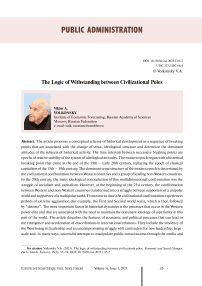The logic of withstanding between civilizational poles
Автор: Volkonsky Viktor A.
Журнал: Economic and Social Changes: Facts, Trends, Forecast @volnc-esc-en
Рубрика: Public administration
Статья в выпуске: 1 т.16, 2023 года.
Бесплатный доступ
The article proposes a conceptual scheme of historical development as a sequence of breaking points that are associated with the change of sense, ideological structure and determine the dominant attitudes of the subjects of historical activity. The time intervals between successive breaking points are epochs of relative stability of the system of ideological attitudes. The modern epoch began with a historical breaking point that came at the end of the 19th - early 20th century, replacing the epoch of classical capitalism of the 15 th - 19th century. The dominant sense structure of the modern epoch is determined by the civilizational confrontation between Western countries and a group of leading non-Western countries. In the 20th century, the main ideological contradiction of this multidimensional confrontation was the struggle of socialism and capitalism. However, at the beginning of the 21st century, the confrontation between Western and non-Western countries transformed into a struggle between supporters of a unipolar world and supporters of a multipolar world. From time to time, the civilizational confrontation experiences periods of extreme aggravation (for example, the First and Second world wars), which is then followed by “detente”. The most important factor in historical dynamics is the processes that occur in the Western power elite and that are associated with the need to maintain the dominant ideology of superiority in this part of the world. The article describes the features of economic and political processes that can lead to the emergence and acceleration of exacerbations in international relations. They include the tendency of the West losing its leadership and an uncompromising struggle with contenders for new leadership; large-scale and, in many ways, successful attempts to manipulate public consciousness through the media and the education system; emergence of powers behind the throne in Western countries; revival of neo-Nazi organizations.
Historical breaking point, epoch of stability, historical development, withstanding, confrontation, west, non-western countries, ideology
Короткий адрес: https://sciup.org/147240258
IDR: 147240258 | DOI: 10.15838/esc.2023.1.85.2
Список литературы The logic of withstanding between civilizational poles
- Acemoglu D., Robinson J.A. (2021). Uzkii koridor [The Narrow Corridor: States, Societies, and the Fate of Liberty]. Moscow: AST.
- Arrighi J. (2006). Dolgii dvadtsatyi vek: den'gi, vlast' i istoki nashego vremeni [The Long Twentieth Century: Money, Power and the Origins of Our Times]. Moscow: Territoriya budushchego.
- Balatsky E.V. (2021). Return on equity as an economic growth driver. Ekonomicheskie i sotsial'nye peremeny: fakty, tendentsii, prognoz=Economic and Social Changes: Facts, Trends, Forecast, 14(1), 26–40 (in Russian).
- Balatsky E.V. (2022). Russia in the epicenter of geopolitical turbulence: Accumulation of global contradictions. Ekonomicheskie i sotsial'nye peremeny: fakty, tendentsii, prognoz=Economic and Social Changes: Facts, Trends, Forecast, 15(4), 42–59. DOI: 10.15838/esc.2022.4.82.3 (in Russian).
- Balatsky E.V., Ekimova N.A. (2020). Driving the economy: The role of a special economic sector. Journal of New Economy, 21(3), 5–27 (in Russian).
- Volkonsky V.A. (2017). XXI vek. Mnogopolyarnyi mir. Trendy i zadachi istorii [21st Century. A Multipolar World. Trends and Tasks of History]. Moscow: Knizhnyi mir.
- Volkonsky V.A. (2021). Smyslovye ustanovki i rol' gosudarstva v epokhu mnogopolyarnogo mira [Semantic Attitudes and the Role of the State in the Epoch of a Multipolar World]. Moscow: Knizhnyi mir.
- Volkonsky V.A. (2022). “The end of capitalism” and power structures: Economics and politics. Ekonomicheskaya nauka sovremennoi Rossii=Economics of Contemporary Russia, 2, 22–37 (in Russian).
- Ganser D. (2017). Sekretnye armii NATO. Operatsiya “Gladio” i terrorizm v Zapadnoi Evrope [NATO’s Secret Armies – Operation Gladio and Terrorism in Western Europe]. Moscow: Kuchkovo pole.
- Glazyev S.Yu. (2016). Glazyev S. (2016). National economy structures in the global economic development. Ekonomika i matematicheskie metody=Economics and the Mathematical Methods, 2, 3–29 (in Russian).
- Glazyev S.Yu. (2017). Bitva za liderstvo v XXI veke. Rossiya – SShA – Kitai. Sem' variantov obozrimogo budushchego [The Battle for Leadership in the 21st century. Russia – USA – China. Seven Options for the Foreseeable Future]. Moscow: Knizhnyi mir.
- Dugin A.G. (2020). Politica Aeterna. Politicheskii platonizm i “Chernoe Prosveshchenie” [Politica Aeterna. Political Platonism and the “Black Enlightenment”]. Moscow: Akademicheskii proekt.
- Zalesskii K. (2022). Za kulisami katastrofy: provokatsii, diplomatiya i voina [Behind the Scenes of the Catastrophe: Provocations, Diplomacy and War]. Moscow: Nashe Zavtra.
- Kochetkov A.V. (2022). “Azov”. Chernoe solntse Ukrainy. Istoriya neonatsistskogo formirovaniya [“Azov”. The Black Sun of Ukraine. The History of a Neo-Nazi Formation]. Moscow: Knizhnyi mir.
- Maslow A. (2002). Dal'nie predely chelovecheskoi psikhiki [The Farther Reaches of Human Nature]. Moscow: Evraziya.
- Sergeitsev T.N., Kulikov D.E., Mostovoi P. (2020). Ideologiya russkoi gosudarstvennosti. Kontinent Rossiya [The Ideology of Russian Statehood. The Continent of Russia]. Saint Petersburg: Piter.
- Stiglitz J. (2015). Tsena neravenstva. Chem rassloenie obshchestva grozit nashemu budushchemu [The Price of Inequality: How Today’s Divided Society Endangers Our Future]. Moscow: Eksmo.
- Schwab K., Malleret T. (2020). COVID-19: velikaya perezagruzka [COVID 19: The Great Reset]. World Economic Forum.
- Fursov A.I. (2022). The only thing worse than having an Anglo-Saxon as friend is having him as enemy. Why? (Anglo-Saxons, Russians, the world: Entering the third century of struggle). In: Fursov A.I. Russkie o glavnom protivnike [Russians about the Main Enemy]. Moscow: Nashe zavtra (in Russian).
- Huntington S. (2019). Stolknovenie tsivilizatsii [The Clash of Civilizations]. Moscow: AST.
- Jung K.G. (1997). Fighting the shadow. In: Jung K.G. Sinkhronichnost' [Synchronicity]. Moscow: Refl-buk; Kiev: Vakler (in Russian).
- Fromm E. (1977). The Anatomy of Human Destructivness. New York: Penguin Books.


